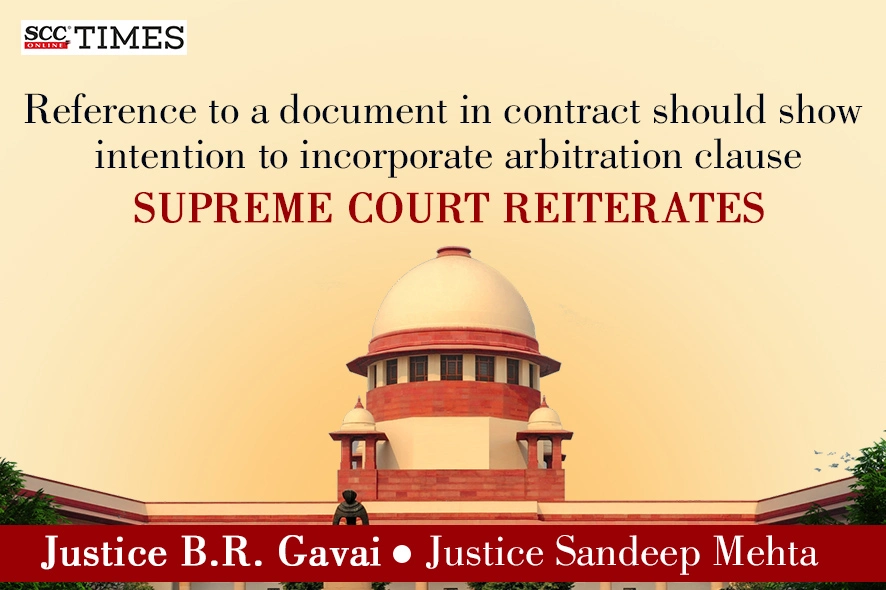Supreme Court: In appeals challenging Delhi High Court’s orders allowing application under Section 11(6) of the Arbitration and Conciliation Act, 1996 (‘Arbitration Act’) appointing sole arbitrator, the Division Bench of B.R. Gavai* and Sandeep Mehta, JJ. reiterated that reference to a specific document in the contract should clearly show the intention of the parties to contract for incorporating arbitration clause in the contract.
Factual Background
The appellant — NBCC, a Public Limited Company and Government of India undertaking engaged in construction of power plants and other infrastructure projects on EPC and/or PMC basis, as against the respondent, a Private Limited Company, engaged in the construction and infrastructure sector.
NBCC issued an invitation for tender on 3-11-2006 for “Construction of Weir containing General Conditions of Contract, Special Conditions of Contract, Bill of Quantity, etc. To which, respondent submitted its Techno Commercial Bid on 16-11-2006, received a Letter of Intent on 4-12-2006 for contract for Construction of the Weir for a total value of Rs 19,08,46,612. As certain disputes arose between the parties, arbitration was invoked by the respondent, but NBCC did not respond to the notice. The respondent therefore filed an application before the High Court under Section 11(6) of Arbitration and proposed appointment of a sole arbitrator, and the same got challenged in the instant matter. The Supreme Court, through order dated 23-07-2021 stayed the further arbitration proceedings.
Court’s Analysis
The Court perused Section 7(5) of Arbitration Act and explained that the issue was no more res integra since the same was considered in M.R. Engineers & Contractors (P) Ltd. v. Som Datt Builders Ltd., (2009) 7 SCC 696 and the Court held the following:
-
when the parties enter a contract, making a general reference to another contract, such general reference would not have the effect of incorporating arbitration clause from document referred, into the contract between the parties;
-
an arbitration clause from another contract can be incorporated into the contract only by a specific reference to the arbitration clause;
-
where a contract between the parties provides for execution or performance of that contract in terms of another contract (containing terms and conditions relating to performance and a provision for settlement of disputes by arbitration), then, the terms of the referred contract in regard to execution/performance apply, as against the arbitration agreement in the referred contract, unless there is special reference to the arbitration clause;
-
where the contract provides for standard form of terms and conditions of an independent trade or professional institution binding them or applying to the contract, such standard form of terms and conditions including any provision for arbitration in such standard terms and conditions, shall be deemed to be incorporated by reference;
-
sometimes, the contract may also speak of parties being familiar with those terms and conditions, or that parties have read and understood the said terms and conditions;
-
where the contract stipulates about conditions of contract of one of the parties to the contract forming a part of their contract, the arbitration clause forming part of such general conditions of contract to apply to the contract between parties.
The Court expressed that Section 7(5) of Arbitration Act itself “provides for a conscious acceptance of the arbitration clause from another document, by the parties, as a part of their contract, before such arbitration clause could be read as a part of the contract between the parties.” The Court therefore concluded that reference to a document in the contract should show the intention to incorporate arbitration clause contained in such document.
While acknowledging the fact that the Court in Inox Wind Ltd. v. Thermocables Ltd., (2018) 2 SCC 519 distinguished the law laid in MR Engineers (supra). The Court went into detail while comparing the two cases on factual distinctions of contracts.
The Court explained that the instant matter was a ‘two-contract’ case and not a ‘single-contract’ case. With reference to the clause on ‘Settlement of Disputes & Arbitration’ under the ‘Additional Terms & Conditions of Contract’, the Court hinted at specification regarding appointment of a specific sole arbitrator or the person appointed by that specific person, as mentioned in the said clause.
With reference to few more clauses, the Court noted that the documents stated shall also form part of agreement, all terms and conditions of the tender issued by DVC to NBCC shall apply mutatis mutandis except where those were expressly modified by NBCC, and that the redressal of dispute shall only be through civil courts of Delhi, and that LOI shall also form part of the agreement.
The Court concluded that the intention of parties was very clear as per the contract that the LOI specifically uses the word ‘only’ before the words ‘be through civil courts having jurisdiction of Delhi alone’.
The Court said that “when there is a reference in the second contract to the terms and conditions of the first contract, the arbitration clause would not ipso facto be applicable to the second contract unless there is a specific mention/reference thereto.” The Court concluded that the instant matter was not one of ‘incorporation’ but a case of ‘reference’ and clarified that a general reference would not have the effect of incorporating arbitration clause.
Therefore, the Court found the Delhi High Court’s decision erring and allowed the instant appeal while quashing and setting aside the impugned order.
CASE DETAILS
2024 SCC OnLine SC 323 Appellants : Respondents : |
Advocates who appeared in this case For Petitioners: For Respondents: |
CORAM :










